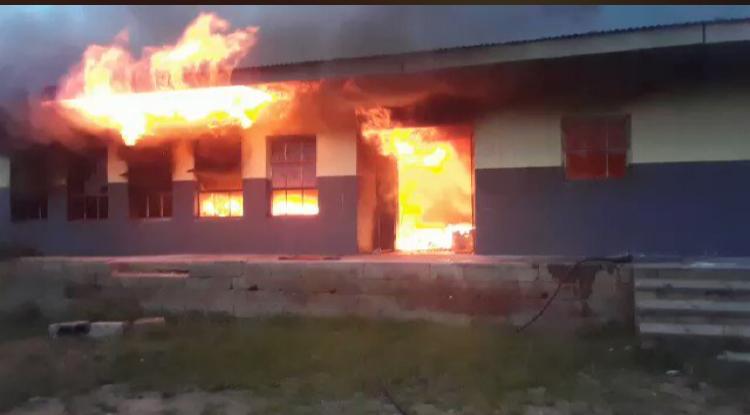NYAKALLO TEFU|
Over 30 000 learners might not be able to return to school on 26 July given the looting and riots that targeted KwaZulu-Natal schools last week.
KwaZulu-Natal Education Spokesperson Muzi Mahlambi told Inside Education on Monday that about 130 schools in his province were vandalised and some even torched amid riots and lootings following the unrest that took place last week in the KwaZulu-Natal and Gauteng provinces.
Reports state that the immediate trigger for the unrest was the jailing of the country’s former president, Jacob Zuma.
Zuma was arrested without trial after being found in contempt of court. The former president is sentenced to 15 months in prison for his repeated refusal to participate in the Zondo Commission’s proceedings.
President Cyril Ramaphosa labelled what followed as an “insurrection,” with protests led by the former president’s supporters spiralling into full-blown riots in Gauteng and KwaZulu-Natal provinces.
READ: Nzimande says the food prices following unrests will affect students
Major highways were blocked, trucks burned, shops and even schools and medical offices ransacked. The army wasdeployed, but the upheaval still wreaked about R15 billion in damage and led to many being killed amid stampedes and clashes with police and rioters.
The insurrection took a surprising turn when on Wednesday schools became the focus of attack.
Radha Roopsingh School just outside Stanger, KZN was shown burning. The office was burned to ashes and equipment including photocopying machines taken from the school premises.
Basic Education Spokesperson Elijah Mhlanga told Inside Education there is no budget to fix the schools.
“There is no budget available. This will affect teachers in the same way it affects learners,” said Mhlanga.
In an interview with Inside Education, KZN education spokesperson said the implications are huge and there are some schools that have to delay reopening because the provincial department is now forced to provide them with mobile classrooms.
Mahlambi said they do not even have the money to provide mobile classrooms for the affected schools.
“We do not have the budget, these incidents come when we already have budget cuts in the department this financial year in the region of R6.2 billion.
“This will cause an even bigger financial constraint than we had before all the unrest happened.
“Already, some programmes were cut off, this means a further cut when it comes to programmes for teaching and learning. The situation will be worse,” said Mahlambi.
Adding that due to the budget cuts, the department had to scale down some programmes it had planned for the year, including repairs at schools affected by a storm in 2019 and those that were vandalised during the Covid-19 Level 5 lockdown last year.
READ: DBE budget cuts increase inequalities between poor and privileged schools
“We had not finished attending those challenges, and now there is this new financial burden that comes on our shoulders – the very same tired shoulders – which collapses us all together in terms of how we move forward,” he said.
Schools were expected to reopen on Monday, 26 July, after they closed to prevent the spread of Covid-19 amid the country’s third wave of infections. Mahlambi said the riots will definitely disturb teaching and learning.
Teacher unions condemned the actions and expressed disappointment.
National Professional Teachers Organization of South Africa (Naptosa)’s executive manager Basil Manuel says they are sickened by images of schools in burning to the ground.
“The reason for the damaging of the schools is apparently being that people were looking for food,” said Manuel.
“Stealing objects and equipment from is a school is contemptable but stealing the future of innocent children and disrupting their lives is unforgiveable,” said Manuel.
Manuel said the time has arrived where the destruction and damage to schools can no longer be dealt with as merely an offence of damage to property.
“It needs to be elevated to something more telling for which more severe and deterrent sentences can be imposed and where the damage it causes children, becomes an aggravating factor,” said Manuel.
The Educators Union of South Africa (EUSA) ’s Spokesperson, Kabelo Mahlobongwane said such criminal activities should not be happening at schools.
“We want to register our disappointment to those who decided that schools were places where such criminal elements could happen,” said Mahlobongwane.
Mahlobongwane said that they have been calling for tighter security in schools for a very long time.
“Such criminal activities have been reported in our schools for a long time, and most reports and studies confirmed that schools are a red zone for crimes,” he said.
READ: Nzimande says the food prices following unrests will affect students
Mahlobongwane said Eusa wants to emphasise its call for government to deploy at least two police in each school across the country to help deal with such criminal activities.
“It is very disappointing on the side of government to not prioritise the safety of institutions that play a vital role in making sure the future of our children is secured.
Nomarashiya Caluza, KZN South African Democratic Teachers Union (Sadtu) ‘s provincial secretary said Sadtu condemns this behaviour from KZN residents.
“This has been happening for a very long time, even before lockdown.
“We had more than 100 schools that were vandalized because people wanted to get access to food at the schools, which is reportedly the case now.
“Computers and food were taken from schools. We are disappointed because it is the responsibility of the community to protect schools,” said Caluza.
She added that schools have historically never had security because communities would protect schools from any form of criminal activity.
“This is why we are disappointed. The national education department cannot look after schools alone, community members also need to play their role in this,” she said.
Extra reporting by Mmadifedile Mofokeng.






